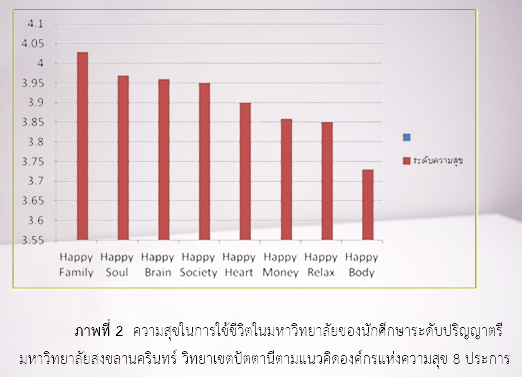นัทธมน ราชเสน ส่อง...ความสุขในการใช้ชีวิตในมหาวิทยาลัยของนักศึกษาระดับปริญญาตรีมหาวิทยาลัยสงขลานครินทร์ วิทยาเขตปัตตานี ตามแนวคิดองค์กรแห่งความสุข
Main Article Content
บทคัดย่อ
การวิจัยนี้มีวัตถุประสงค์เพื่อ 1) ศึกษาระดับความสุขในการใช้ชีวิตในมหาวิทยาลัยของนักศึกษาระดับปริญญาตรีของมหาวิทยาลัยสงขลานครินทร์ วิทยาเขตปัตตานี ตามแนวคิดองค์กรแห่งความสุข 2) ศึกษาปัจจัยส่วนบุคคลที่ส่งผลต่อความสุขในการใช้ชีวิตในมหาวิทยาลัยของนักศึกษาระดับปริญญาตรีมหาวิทยาลัยสงขลานครินทร์ วิทยาเขตปัตตานี กำหนดกลุ่มตัวอย่าง คือนักศึกษาระดับปริญญาตรี ในปีการศึกษา 2558 จำนวน 367 คน จากการใช้ตารางสำเร็จรูปของเครจซี่และมอร์แกน และสุ่มตัวอย่างแบบอาศัยความน่าจะเป็น โดยวิธีการสุ่มแบบแบ่งชั้นอย่างเป็นสัดส่วน เพื่อกำหนดขนาดกลุ่มตัวอย่างในแต่ละคณะ เครื่องมือที่ใช้ในการวิจัย ได้แก่ แบบสอบถามที่มีค่าความเชื่อมั่นเท่ากับ .951 วิเคราะห์ข้อมูลโดยหาค่าร้อยละ ค่าเฉลี่ย และส่วนเบี่ยงเบนมาตรฐาน การวิเคราะห์ค่าเฉลี่ย 2 กลุ่มตัวอย่างอิสระจากกัน และการวิเคราะห์ความแปรปรวนทางเดียว
ผลการวิจัยพบว่า ความสุขในการใช้ชีวิตตามแนวคิดองค์กรแห่งความสุขของนักศึกษาระดับปริญญาตรีของมหาวิทยาลัยสงขลานครินทร์ วิทยาเขตปัตตานี อยู่ในระดับมาก เมื่อเปรียบเทียบระดับความสุขในการใช้ชีวิตในมหาวิทยาลัยของนักศึกษาระดับปริญญาตรีคณะต่าง ๆ ไม่แตกต่างกัน แสดงให้เห็นถึงการดูแลการจัดสวัสดิการ และการบริการนักศึกษาที่มีประสิทธิภาพและประสิทธิผล ส่งเสริมคุณภาพชีวิตที่ดีให้แก่นักศึกษาของมหาวิทยาลัยสงขลานครินทร์ วิทยาเขตปัตตานี อย่างเป็นธรรมและเท่าเทียมกัน ปัจจัยส่วนบุคคลที่ส่งผลต่อความสุขฯ คือ 1) เพศ พบว่าเพศชาย จะมีความสุขในการใช้ชีวิตมากกว่าเพศหญิง และ 2) ที่พักระหว่างเรียนส่งผลต่อความสุขในการใช้ชีวิตในมหาวิทยาลัย โดยนักศึกษาที่พักในหอพักมหาวิทยาลัย จะมีความสุขมากกว่านักศึกษาที่พักนอกมหาวิทยาลัย
Article Details

อนุญาตภายใต้เงื่อนไข Creative Commons Attribution-NonCommercial-NoDerivatives 4.0 International License.
เอกสารอ้างอิง
เกรียงศักดิ์ เจริญวงศ์ศักดิ์. (2547). การศึกษาด้อยสร้างคุณธรรมก่อวิกฤตสังคมทราม. กรุงเทพฯ: ม.ป.ท.
จรัสศรี เพ็ชรคง และพัทธวรรณ ชูเลิศ. (2560). ปัจจัยด้านการเรียนการสอนที่ส่งผลต่อความสุขในการเรียนรู้ของนักศึกษาพยาบาล วิทยาลัยพยาบาลบรมราชชนนีจักรีรัช สถาบันพระบรมราชชนก (รายงานการวิจัย). สำนักงานปลัดกระทรวงสาธารณสุข.
ชาญวิทย์ วสันต์ธนารัตน์. (2556). มาสร้างองค์กรแห่งความสุขกันเถอะ. สองขาครีเอชั่น.
ธัญณชน ใจบุญตัน. (2559). ปัจจัยเชิงสาเหตุที่มีอิทธิพลต่อความสุขในการเรียนของนักศึกษาระดับปริญญาตรี มหาวิทยาลัยราชภัฎเชียงราย. [วิทยานิพนธ์ปริญญามหาบัณฑิต]. มหาวิทยาลัยราชภัฎเชียงราย.
แผนงานสุขภาวะองค์กรภาคเอกชน สำนักงานกองทุนสนับสนุนการสร้างเสริมสุขภาพ. (2552). มาสร้างองค์กรแห่งความสุขกันเถอะ. แผนงานสุขภาวะองค์กรภาคเอกชน สำนักงานกองทุนสนับสนุนการสร้างเสริมสุขภาพ.
ปริยาภรณ์ ตั้งคุณานันต์. (2562). การบริหารงานวิชาการในสถานศึกษาเพื่อการพัฒนาที่ยั่งยืน. มีน เซอร์วิสซัพพลาย.
ปานทิพย์ พอดี. (2564). รูปแบบการเรียนรู้อย่างมีความสุข (FART) HAPPY learning pattern (FART). วารสารวิชาการสังคมมนุษย์ มหาวิทยาลัยราชภัฎนครศรีธรรมราช, 11(2) 78-89.
พระมหาวุฒิชัย วชิรเมธี. (2555). ทางสายกลางของการพัฒนา. การพัฒนาที่ยั่งยืนแนวพุทธกับเศรษฐกิจ.โรงพิมพ์เดือนตุลา.
ภัทรจิต จุมพล กอซโซลี. (2553). การวัดความสุข. วารสารเศรษฐกิจและสังคม, 47(3), 34-38.
มหาวิทยาลัยสงขลานครินทร์ วิทยาเขตปัตตานี. (2558). สถิตินักศึกษา. https://regist.pn.psu.ac.th/main /?page=stat
วรรณลักษณ์ เมียนเกิด. (2560). การวิจัยในงานสังคมสงเคราะห์. จรัลสนิทวงศ์การพิมพ์.
วันชัย ธรรมสัจการ, ณัฏิยา ชูถึง, ภาสกร สวนเรือง และพลภัทร น้อยพันธ์. (2550). แลลึกในการจัดการและการพักอาศัยในหอพักสู่หนทางแห่งความสุขและคุณภาพชีวิตของนักศึกษามหาวิทยาลัยสงขลานครินทร์ วิทยาเขตหาดใหญ่ (รายงานการวิจัย). คณะศิลปศาสตร์ มหาวิทยาลัยสงขลานครินทร์ วิทยาเขตหาดใหญ่ สงขลา.
สิน พันธุ์พินิจ. (2549). เทคนิคการวิจัยทางสังคมศาสตร์ (พิมพ์ครั้งที่ 2). จูนพับลิซซิ่ง.
สำนักงานเลขาธิการสภาการศึกษา กระทรวงศึกษาธิการ. (2560). แผนการศึกษาแห่งชาติ พ.ศ.2560-2579.พริกหวานกราฟฟิค.
อิทธิพล อินทวิชญ. (2550). สำรวจระดับความสุขของประชาชน กรณีศึกษาเขตพื้นที่เทศบาลตำบลโคกกลอย อำเภอตะกั่วทุ่ง จังหวัดพังงา. [การศึกษาอิสระปริญญามหาบัณฑิต]. มหาวิทยาลัยขอนแก่น.
Asghar, M., Minichiello, A., & Iqbal, A. (2022). Perceived Factor Contributing to the Subjective Wellbeing of Undergraduate Engineering Students: An Exploratory Study. International Journal of Environmental Research and Public Health, 19(23), 16284. https://doi.org/10.3390/ijerph192316284
Ibrahim, A. (2018). The happiness of undergraduate students at one university in the United Arab Emirates. International Journal of Research Studies in Education, 7(3), 49-61. https://doi.org/10.5861/ijrse.2017.1804
Wan, T. (2023). Constitutionalization of Happiness: A Global and Comparative Inquiry. German Law Journal, 24(7), 1209–1236. https://doi.org/10.1017/glj.2023.84
Jiang, Y., Lu, C., Chen, J., Miao, Y., li, Y., & Deng, Q.(2022). Happiness in University Students: Personal, Familial, and Social Factors: A Cross-Sectional Questionnaire Survey. International Journal of Environmental Research and Public Health, 19(8), 4713. http s://doi.org/10.3390/ijerph19084713


